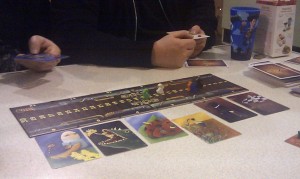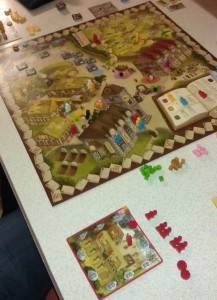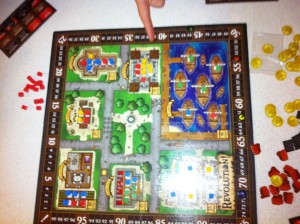Another Newcastle Gamers session… and another occurrence of the (now-familiar) minor panic when everybody arrives at the venue and we discover we’re locked out for one reason or another. Fortunately, the circus school were using the building next door, and there’s some kind of interconnection between the two buildings, so Chairman John managed to wheedle his way through via that route and open the doors from the inside. ‘Phew. As it happened, Robert turned up moments later with his key, so we’d have got in the venue with a little more patience anyway. But… you know how it is… those games won’t play themselves – every second counts!
Stuff I played this week:
Snowdonia

First up was a slightly out-of-the-ordinary game of Snowdonia. What made it out-of-the-ordinary? Well… Owain has managed to get his hands on a playtest version of an un-released expansion for the game, and he was keen to give it a spin with 4 players. I’d already tried the expansion with 2 players (more about that later) and was keen to give it another go… and Olly and Michael had also informally arranged to play via the club’s google+ group. As it turned out, Michael couldn’t make it on the night, so Freddie took the vacant seat.
Since I’ve discussed the basic Snowdonia game in a previous blog entry, I’ll mostly concentrate on our experiences with the expansion here. The current version seats up to 4 players, is based on the Jungfrau mountain railway in Switzerland, and introduces two significant changes to the game: Dynamite and Snow.
In the original version of Snowdonia, building the railway is (essentially) a two-stage process. First, you use your workers to clear rubble from the course of the railway… and once the rubble is out of the way, you can put down railway track. The Jungfrau expansion adds a preliminary step to this routine. The (real-life) Jungfrau is basically a 9km tunnel, cut straight through the mountains and glaciers of the Bernese alps … so in this version of the game — prior to any rubble being shifted — you need to blast your way through the mountains with dynamite. You get victory points for performing these blasting operations and also — in another departure from the base game — the number of track spaces between each station is semi-randomized, and only revealed as each segment of the route is blasted open.
Dynamite is a scarce resource … you can collect a single stick (OK… “cube”) of dynamite whenever you visit the “works” action space, and there are some interesting strategic considerations to be made in where and when you use it. In addition to using dynamite to blast your way through the mountains, you can also deploy it as a super-speedy way to clear rubble during subsequent excavations… (though at a penalty of not being able to take any rubble cubes into your inventory — which can impact your contract completion). Dynamite is a really interesting addition to the game — I like it a lot
Somewhat less-thematically-convincing (but also great to have in the game) is the snow mechanism. In the Jungfrau variant, a weather type of “Snow” replaces the “Fog” of the base game… and whenever it snows, previously-cleared excavations get re-covered with snow. Or, more accurately: re-covered with rubble … since you basically just stack rubble cubes back in the the affected spots. This “replaced” rubble can then be cleared and collected just like any other rubble can. So it’s snow by name, but rubble by effect.
While the presence of “snow” on an underground railway might be a bit thematically strange, its effect improves the game massively. Admittedly, I don’t have a vast amount of experience with the base version of Snowdonia, but I did feel that the original game had a bit of a strange pace about it — mostly due to the way that the white cubes would auto-complete chunks of the railway for you in unpredictable fits and starts. The snowfall seems to temper that a bit; it rolls back the auto-completion from time to time, cancels out the white-cube station-building events, and generally makes the whole game seem to flow a bit more steadily. It just feels better, somehow. It’s hard to explain, but — for my money — snow is a very good addition. Even if it is bizarre physics-defying underground snow.
There are a couple of other tweaks in the current rule-set — surveyors score slightly differently, and contracts have been tweaked — but the dynamite and snow are the main features. And splendid main features they are too!
An enjoyable time was had by all… I scored the most, but sadly I can’t attribute my victory entirely to sharp gameplay. I’d already played a 2p Jungfrau game with Owain earlier in the week, in which we’d come to the conclusion that the special advantages conferred by a couple of the trains were maybe a bit overbalanced in the Jungfrau variant — and I was pretty much using this second game as an opportunity to sanity-check that theory. Sure enough, the owners of the “suspect” trains came in first and second place. Still, that’s kind of the point in playtesting, right? (and word from the game designer — Tony Boydell — is that one of the trains has now been neutered, and the other is possibly being removed from the variant completely. So all’s well that ends well).
I’m really impressed by what I’ve seen of the Jungfrau expansion so far… in fact, I think I already prefer it to base game(!). If you like Snowdonia, mark this one down as an essential purchase
Next: Hanabi

A few club members had arranged to go out for food together, and we needed a short-ish game to help make all the arrangements synch up … so out came Hanabi. Hanabi is the weird co-operative firework-themed card game that I’ve written about pretty extensively here… so I’ll spare you a repeat explanation. Suffice to say, the club record remained steadfastly un-broken; we scored a decidedly average 15, ranking the show as “Honorable, but nobody will remember it”. Boo!
Dixit Oddysey
I’m surprised I haven’t written about the Dixit family of games before… but, I guess I’ve never played it at Newcastle Gamers, so that’s probably why.
Dixit is an unusual game. Its main component is a deck of cards, each containing an unusual / whimsical / somewhat surreal illustration. A ladybird with a telescope… A man being chased by a venus flytrap… A chicken in a police uniform… That kind of thing. When it’s your turn to play, you pick a card from your hand and invent a clue to allow the other players to identify it (the rules say the clue can be verbal, or a mime, or singing… pretty much anything goes. Though I’ve never seen anybody do anything other than give a verbal clue). Next, each other player has to donate one of their cards to a central stack, and your original card is shuffled in amongst them. Your opponents then have to try to identify your card.
If another player guesses correctly, they score a point, and you (the clue giver) get 3 points. However, there’s a catch: if everybody guesses your card successfully, you score nothing. Therefore, you’re trying to give a clue that is sufficiently oblique to only be guessed by one or two of your opponents. Aside from another scoring rule or two that I’ll not bore you with here, that’s pretty much the whole game. It’s simple, but clever.
Here’s the downside: I find Dixit to be a game that’s a little bit difficult to play against a bunch of opponents that you don’t know very well. For me, the game shines when you have a certain degree of empathy or commonality in the group… and you know what sort of level you should pitch your clues at or what sort of nuances you can get away with. More of “friends & family” kind of game — it never seems to work so well for me when played with relative strangers. I suppose if I played it a lot at Newcastle Gamers — or against the people there that I know a bit better than most — I’d get a better feel for giving clues in that particular context… but there’s usually other stuff around that I’m more interested in playing. So I don’t.
As such, Dixit was probably my least-favourite game of the night. Still, other folks were keen to play it, enjoyed it, and it filled a gap. But by the end of the game, I was keen to get back to some cube-pushing eurogame action…
…so out came: Village
After having a bit of a hiatus from playing Village, this turned out to be my second game within the space of a single week! They were both very different experiences too… the previous game had gone at a fairly leisurely pace — I managed to bag every location on the travelling-the-world task, and scores were pretty high across the board. This game, by comparison, flew past very quickly. Deaths came thick and fast (the residents of this particular village clearly had far harder lives than the people living in the previous one!) … and I think we only managed to play three full rounds. I was making a blind play for the world-travelling task again (never a good idea in a short game) and barely managed to cover half the available destinations… in fact, I didn’t really get a decent points engine into play at all; even my family deaths were badly-timed and failed to get any significant presence in the book of remembrance. Hmmm. A good lesson in the perils of taking the pace of the game for granted!
Skull and Roses

Another filler… and a game I’d read about but hadn’t played before. Skull and Roses is a very simple bluffing game; basically, each player has a set of 4 beer mats… one of which depicts a skull on the flip-side, while the others feature roses. Each turn you either add a card (/mat) to the stack in front of you, or make a bet that you can flip x amount of cards over without encountering a skull. Then the other players can either raise or call your bet. The clever bit being… you must flip over every card in your own stack before you’re allowed to flip anybody else’s cards, so there’s a big double-bluff thing going on; you can deliberately bury a skull in your own pile, then open the betting (trying to entice somebody into raising the bet) — but if you’re actually called on to play that bet, you’ll lose.
As bluffing games go, it’s elegant, and very very clever — probably one of the best bluffing games I’ve played (though the genre, as a whole, doesn’t usually attract me). It’s a bit of an oddity though, and I’m kind of surprised it exists as a “published” game — the rules are simple, and you could easily play it with a regular deck of cards. The “biker gang” beer mats do add a certain atmosphere though. And it worked great as a 10-minute filler
Finally: Revolution
Another new-to-me game. Revolution is a light-ish title concerning hidden bidding and area control. Each round, you get a number of tokens to use to gain influence on various characters within the town… there are cash tokens (for bribes), envelopes (blackmail) and fists (for violence!). You make your bids in secret, using a mini-board hidden behind a shield … then bids are simultaneously revealed, and whoever made the highest value bid on each individual character gets various benefits — these might be support points (i.e. victory points), bidding tokens to use in the next round, or the ability to place (or re-arrange) coloured cubes in the various areas of the town. At the end of the game, there are bonus points awarded depending on who has dominance in each section of the town.
The game can get a bit nasty towards the end, as people compete for the last few spots of dominance. I fell into the trap of making tit-for-tat attacks on Jerome’s areas, as I’d earmarked him as my most dangerous opponent. This ended up backfiring, as both we ended up in 3rd and 4th place… (in a field of 4 — oops!). Meanwhile, Lloyd (the only person who had played before) coasted into a significant lead. I wish I’d paid more attention to how he did it — he seemed to be accumulating huge reservoirs of influence tokens in the critical final rounds.
Not a bad game; it was easy to pick up, not overly complex, and somehow felt like exactly the right sort of game to be playing at that point in the evening… certainly not a triple-A title, but it was fun and something I’d quite happily play again.
Summary: An excellent evening’s gaming. Two top class games (Snowdonia and Village), and a smattering of perfectly good secondary titles filling the gaps. Even the Dixit session — which I realise I was maybe a bit down on in the tone of this article — wasn’t really that bad; I’ve certainly played far worse.
The next session is scheduled for Saturday the 29th December, and is planned to be an all-dayer (should be a good opportunity for everybody to give their new Christmas pressies an outing!). As an added bonus, we definitely have a key for the front door this time. Looking forward to it already!
CREDITS: Session pics stolen from Ana, Owain and John F. The Jungfrau playtest is mentioned here with the designer’s blessing — though we totally forgot to photograph it (doh!!). Newcastle Gamers meets on the second and last Saturday of the month. Usual cost is £3 (or £1 for concessions), but your first visit is free … check our G+ group for more info.





 Follow
Follow